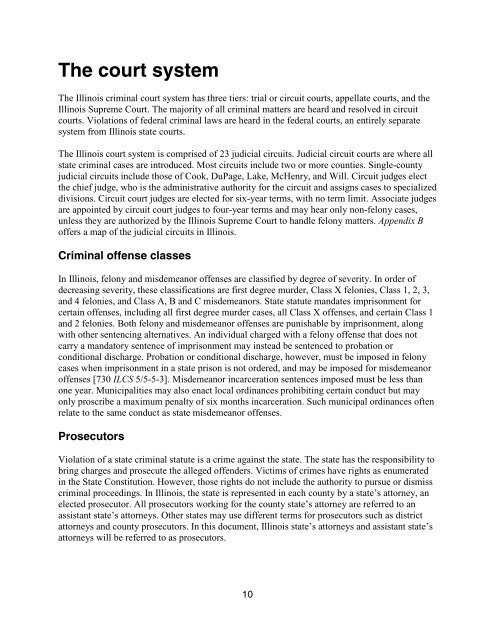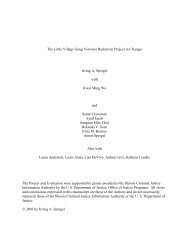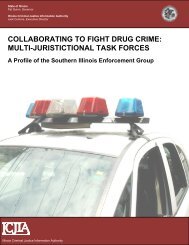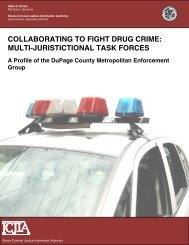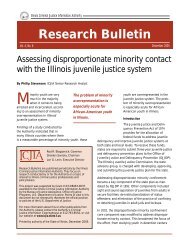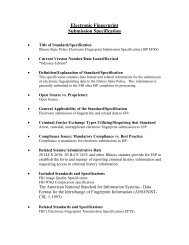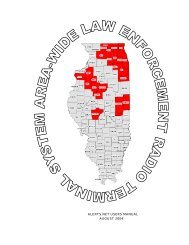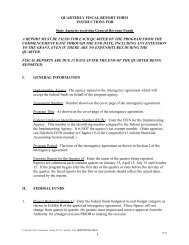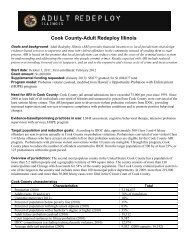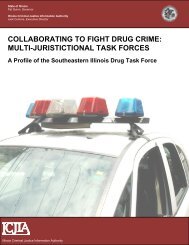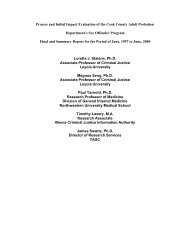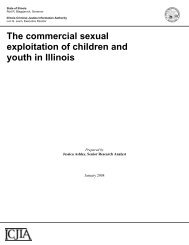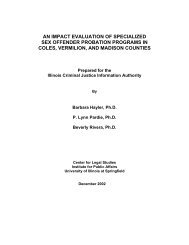policies and procedures of the illinois criminal justice system
policies and procedures of the illinois criminal justice system
policies and procedures of the illinois criminal justice system
Create successful ePaper yourself
Turn your PDF publications into a flip-book with our unique Google optimized e-Paper software.
The court <strong>system</strong><br />
The Illinois <strong>criminal</strong> court <strong>system</strong> has three tiers: trial or circuit courts, appellate courts, <strong>and</strong> <strong>the</strong><br />
Illinois Supreme Court. The majority <strong>of</strong> all <strong>criminal</strong> matters are heard <strong>and</strong> resolved in circuit<br />
courts. Violations <strong>of</strong> federal <strong>criminal</strong> laws are heard in <strong>the</strong> federal courts, an entirely separate<br />
<strong>system</strong> from Illinois state courts.<br />
The Illinois court <strong>system</strong> is comprised <strong>of</strong> 23 judicial circuits. Judicial circuit courts are where all<br />
state <strong>criminal</strong> cases are introduced. Most circuits include two or more counties. Single-county<br />
judicial circuits include those <strong>of</strong> Cook, DuPage, Lake, McHenry, <strong>and</strong> Will. Circuit judges elect<br />
<strong>the</strong> chief judge, who is <strong>the</strong> administrative authority for <strong>the</strong> circuit <strong>and</strong> assigns cases to specialized<br />
divisions. Circuit court judges are elected for six-year terms, with no term limit. Associate judges<br />
are appointed by circuit court judges to four-year terms <strong>and</strong> may hear only non-felony cases,<br />
unless <strong>the</strong>y are authorized by <strong>the</strong> Illinois Supreme Court to h<strong>and</strong>le felony matters. Appendix B<br />
<strong>of</strong>fers a map <strong>of</strong> <strong>the</strong> judicial circuits in Illinois.<br />
Criminal <strong>of</strong>fense classes<br />
In Illinois, felony <strong>and</strong> misdemeanor <strong>of</strong>fenses are classified by degree <strong>of</strong> severity. In order <strong>of</strong><br />
decreasing severity, <strong>the</strong>se classifications are first degree murder, Class X felonies, Class 1, 2, 3,<br />
<strong>and</strong> 4 felonies, <strong>and</strong> Class A, B <strong>and</strong> C misdemeanors. State statute m<strong>and</strong>ates imprisonment for<br />
certain <strong>of</strong>fenses, including all first degree murder cases, all Class X <strong>of</strong>fenses, <strong>and</strong> certain Class 1<br />
<strong>and</strong> 2 felonies. Both felony <strong>and</strong> misdemeanor <strong>of</strong>fenses are punishable by imprisonment, along<br />
with o<strong>the</strong>r sentencing alternatives. An individual charged with a felony <strong>of</strong>fense that does not<br />
carry a m<strong>and</strong>atory sentence <strong>of</strong> imprisonment may instead be sentenced to probation or<br />
conditional discharge. Probation or conditional discharge, however, must be imposed in felony<br />
cases when imprisonment in a state prison is not ordered, <strong>and</strong> may be imposed for misdemeanor<br />
<strong>of</strong>fenses [730 ILCS 5/5-5-3]. Misdemeanor incarceration sentences imposed must be less than<br />
one year. Municipalities may also enact local ordinances prohibiting certain conduct but may<br />
only proscribe a maximum penalty <strong>of</strong> six months incarceration. Such municipal ordinances <strong>of</strong>ten<br />
relate to <strong>the</strong> same conduct as state misdemeanor <strong>of</strong>fenses.<br />
Prosecutors<br />
Violation <strong>of</strong> a state <strong>criminal</strong> statute is a crime against <strong>the</strong> state. The state has <strong>the</strong> responsibility to<br />
bring charges <strong>and</strong> prosecute <strong>the</strong> alleged <strong>of</strong>fenders. Victims <strong>of</strong> crimes have rights as enumerated<br />
in <strong>the</strong> State Constitution. However, those rights do not include <strong>the</strong> authority to pursue or dismiss<br />
<strong>criminal</strong> proceedings. In Illinois, <strong>the</strong> state is represented in each county by a state’s attorney, an<br />
elected prosecutor. All prosecutors working for <strong>the</strong> county state’s attorney are referred to an<br />
assistant state’s attorneys. O<strong>the</strong>r states may use different terms for prosecutors such as district<br />
attorneys <strong>and</strong> county prosecutors. In this document, Illinois state’s attorneys <strong>and</strong> assistant state’s<br />
attorneys will be referred to as prosecutors.<br />
10


